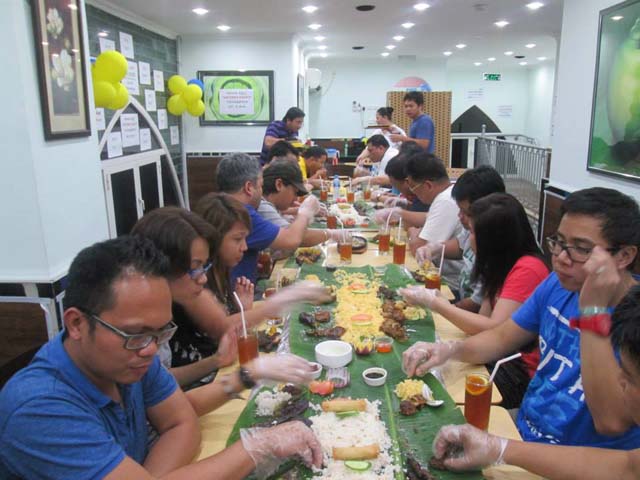Filtered By: Pinoyabroad
Pinoy Abroad
Pinoy-owned resto in UAE lets customers experience boodle fight
By LUCKY MAE F. QUILAO

AL AIN, United Arab Emirates—What has been an eating style in the military has become an overseas Filipino worker’s concept for his restaurant here.
“Our real concept was a fast casual restaurant that serves Filipino food, and our main dish was the ‘chicken inasal’ and a variety of inihaw dishes,” shared Joseph Ronald Calara, 31, owner of The Filipino Kitchen Restaurant (TFKR) in Abu Dhabi, in an e-mail.
After 10 months of operation, though, Calara decided to add on its menu the “Boodle Fight.”
“Boodle Fight is not new anymore to Filipinos,” he said. “The thing is, no one is doing it.”
The dishes in the TFKR’s Boodle Fight cost from Dh168 (P2,009.00), which is good for four to six people, to Dh495 (P5,919.00), good for 12-15 people.
Challenge
Calara said the biggest challenge he experienced is how to build TFKR's name “since there are already lots of Filipino restaurant here in Abu Dhabi.”
“It took us almost six months or maybe more before we can say that we are starting to get known,” he said.
But Calara does not regret establishing his first business. Its bestseller, the “chicken inasal,” is served with unlimited rice, atchara, and soup all for DH19 (P227.00).
“Napili ko ang restaurant dahil parami nang parami din naman ang mga Pinoy dito sa UAE. At alam naman natin na ang mga Pinoy ay mahihilig kumain,” Calara said.
In fact, he and his wife are also fond of eating out. “Mahilig din kami ng asawa ko na kumain sa iba’t-ibang restaurant at magluto.”
Customers
Established on October 21, 2012, the TFKR was envisioned with Calara’s friend and cousin. His partner is a Saudi Arabian national.
“Nag-isip kami nun ng konsepto na papatok sa mga Pilipino,” Calara said. “Dahil ang inasal ang sumisikat sa Pilipinas nung mga panahon na yun, ginawa naming pangunahing produkto ang ‘chicken inasal.’”
To date, the TFKR has already grown a customer base.
“The TFKR has lots of customers—about 85% are Filipinos while 15% are from different nationalities, especially American and British,” Calara said.
“There would be queues outside, waiting almost every night,” he added. —KBK, GMA News
More Videos
Most Popular



